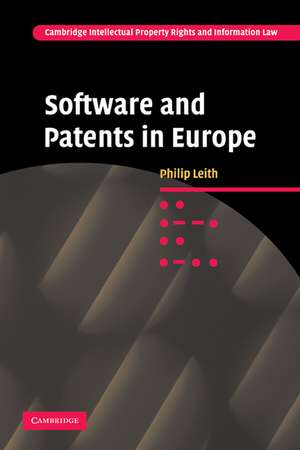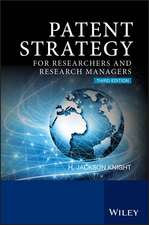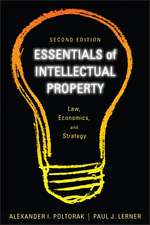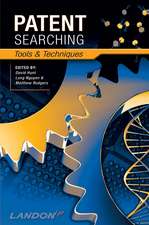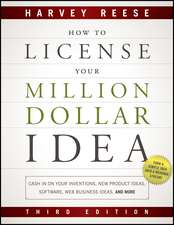Software and Patents in Europe: Cambridge Intellectual Property and Information Law, cartea 9
Autor Philip Leithen Limba Engleză Paperback – 29 iun 2011
| Toate formatele și edițiile | Preț | Express |
|---|---|---|
| Paperback (1) | 331.09 lei 6-8 săpt. | |
| Cambridge University Press – 29 iun 2011 | 331.09 lei 6-8 săpt. | |
| Hardback (1) | 766.43 lei 6-8 săpt. | |
| Cambridge University Press – 17 oct 2007 | 766.43 lei 6-8 săpt. |
Din seria Cambridge Intellectual Property and Information Law
- 9%
 Preț: 695.67 lei
Preț: 695.67 lei -
 Preț: 285.16 lei
Preț: 285.16 lei - 9%
 Preț: 766.16 lei
Preț: 766.16 lei - 14%
 Preț: 726.42 lei
Preț: 726.42 lei -
 Preț: 185.40 lei
Preț: 185.40 lei - 14%
 Preț: 788.63 lei
Preț: 788.63 lei -
 Preț: 286.30 lei
Preț: 286.30 lei -
 Preț: 206.84 lei
Preț: 206.84 lei - 23%
 Preț: 853.98 lei
Preț: 853.98 lei -
 Preț: 335.34 lei
Preț: 335.34 lei -
 Preț: 445.69 lei
Preț: 445.69 lei - 14%
 Preț: 901.48 lei
Preț: 901.48 lei - 14%
 Preț: 784.48 lei
Preț: 784.48 lei - 14%
 Preț: 900.65 lei
Preț: 900.65 lei - 11%
 Preț: 500.96 lei
Preț: 500.96 lei -
 Preț: 320.55 lei
Preț: 320.55 lei - 11%
 Preț: 457.05 lei
Preț: 457.05 lei -
 Preț: 322.51 lei
Preț: 322.51 lei -
 Preț: 320.55 lei
Preț: 320.55 lei -
 Preț: 321.31 lei
Preț: 321.31 lei -
 Preț: 285.75 lei
Preț: 285.75 lei - 14%
 Preț: 728.05 lei
Preț: 728.05 lei - 14%
 Preț: 900.65 lei
Preț: 900.65 lei - 14%
 Preț: 895.68 lei
Preț: 895.68 lei - 14%
 Preț: 727.26 lei
Preț: 727.26 lei -
 Preț: 283.63 lei
Preț: 283.63 lei - 14%
 Preț: 729.73 lei
Preț: 729.73 lei - 14%
 Preț: 776.59 lei
Preț: 776.59 lei - 11%
 Preț: 520.41 lei
Preț: 520.41 lei -
 Preț: 396.20 lei
Preț: 396.20 lei - 14%
 Preț: 755.35 lei
Preț: 755.35 lei - 14%
 Preț: 725.43 lei
Preț: 725.43 lei -
 Preț: 322.51 lei
Preț: 322.51 lei - 14%
 Preț: 1008.85 lei
Preț: 1008.85 lei -
 Preț: 470.76 lei
Preț: 470.76 lei -
 Preț: 288.04 lei
Preț: 288.04 lei
Preț: 331.09 lei
Nou
Puncte Express: 497
Preț estimativ în valută:
63.35€ • 66.15$ • 52.32£
63.35€ • 66.15$ • 52.32£
Carte tipărită la comandă
Livrare economică 15-29 aprilie
Preluare comenzi: 021 569.72.76
Specificații
ISBN-13: 9780521329620
ISBN-10: 0521329620
Pagini: 214
Dimensiuni: 152 x 229 x 11 mm
Greutate: 0.29 kg
Editura: Cambridge University Press
Colecția Cambridge University Press
Seria Cambridge Intellectual Property and Information Law
Locul publicării:Cambridge, United Kingdom
ISBN-10: 0521329620
Pagini: 214
Dimensiuni: 152 x 229 x 11 mm
Greutate: 0.29 kg
Editura: Cambridge University Press
Colecția Cambridge University Press
Seria Cambridge Intellectual Property and Information Law
Locul publicării:Cambridge, United Kingdom
Cuprins
Introduction; 1. Software as machine; 2. Software as software; 3. Policy arguments; 4. Software patent examination; 5. Holding the line: algorithms, business methods and other computing ogres; 6. The third way: between patent and copyright?; 7. Conclusion: dealing with and harmonising 'radical' technologies.
Descriere
This text advocates revisions to the existing system for patenting software in Europe.
